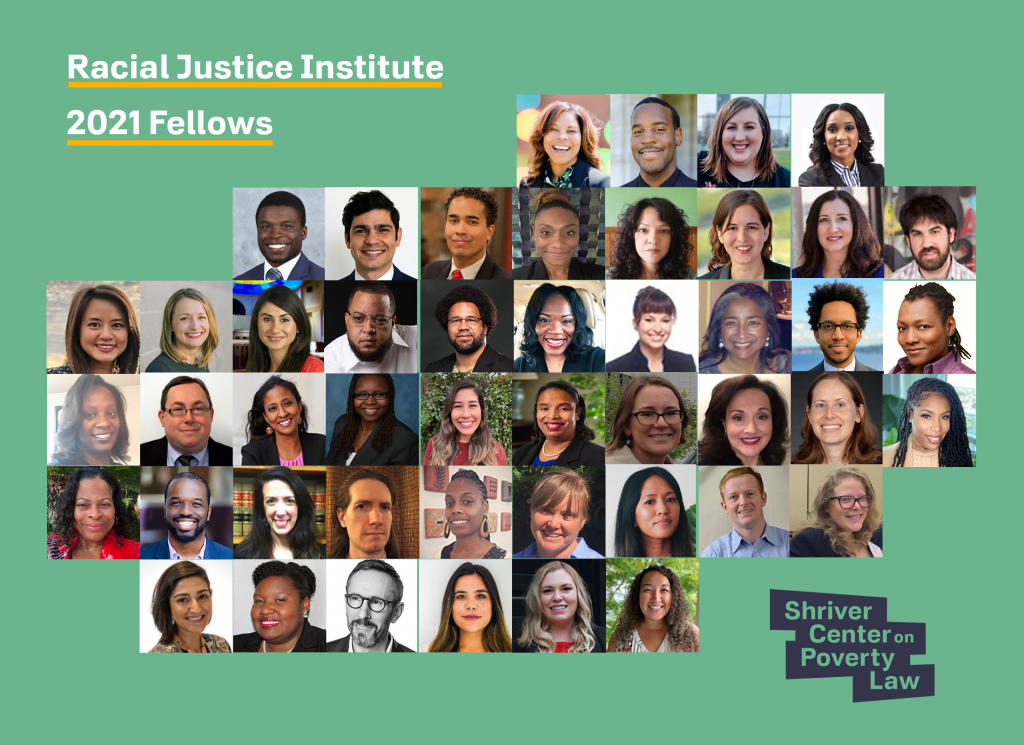Groundbreaking program now in its eighth year centers racial equity in anti-poverty advocacy.
April 22, 2021
Contact: Lane Pickett, 312.368.5231
lanepickett@povertylaw.org
Groundbreaking Program Now in its Eighth Year Centers Racial Equity in Anti-Poverty Advocacy
The Shriver Center on Poverty Law today announced 47 Fellows have been selected to take part in its 2021 Racial Justice Institute (RJI), a leadership program that equips and coordinates anti-poverty advocates to affirmatively advance racial equity.
The past year has laid bare the systemic inequities and structural racism that many communities experience daily. In response to a national call to support Black lives, organizations have been challenged to examine their practices and dismantle barriers to opportunity. Legal aid and public interest advocates are key to achieving important systemic changes in their client communities; however, sustainable change must be grounded in an understanding of key race equity concepts and specialized tools.
The Shriver Center’s Racial Justice Institute grounds advocates in a commitment to race equity as an integral and essential part of anti-poverty advocacy and prepares them to tackle these issues on behalf of the communities they serve. Following seven months of intensive training, Racial Justice Institute fellows join a growing national network of nearly 300 alumni advancing race equity issues across the country.

This year’s RJI Fellows include a diverse group of public interest lawyers, legal aid attorneys, community advocates, executive leaders, and even a judge. They come from 16 organizations advancing justice in 10 states, including 11 organizations new to the RJI.
“The COVID-19 pandemic and economic crisis, combined with the racial reckoning during the past year, have exposed racial disparities experienced daily in the communities that anti-poverty advocates serve,” said Kimberly Merchant, Director of the Racial Justice Institute and Network. “The Racial Justice Institute equips these advocates to take a strategic, explicit approach to eliminating racial disparities, dismantling barriers to opportunity, and strengthening communities of color.”
The 2021 Fellows come to the Racial Justice Institute with experience in a wide range of advocacy areas, including criminal justice reform, healthcare, second chance opportunities, economic justice, disability justice, immigrants’ rights, and affordable housing. Under the intensive seven-month RJI program that begins in May, the 2021 Fellows will be exposed to a core set of racial equity concepts that they can apply to the advocacy in which they are currently engaging.
“This year’s Fellows are working with communities facing many systemic challenges, including individuals experiencing discrimination in the criminal justice system, people with disabilities facing intersectional issues and discrimination, and families of color harmed by the child welfare system,” said Janerick Holmes, Associate Director of the Racial Justice Institute and Network. “RJI will offer these Fellows a framework to contextualize structural racism, systems thinking, social cognition and implicit bias that they can use to confront and impact racial disparities in the communities they serve.”
Entering its eighth year, the Shriver Center’s Racial Justice Institute has cultivated nearly 300 advocates, representing over 90 organizations in 31 states and the District of Columbia. Fellows emerge from the program ready to help shape policies that support a more racially just society and continue to work in concert as part of the Shriver Center’s Racial Justice Institute Network.
The full list of the 2021 Fellows:
Afrasan Adams, Bay Area Legal Services
Alisa L. Anderson, Bet Tzedek Legal Services
Johanna Baumann, Bet Tzekdek Legal Services
Virginia Benzan, Massachusetts Law Reform Institute
Earlene Bolton, Legal Services of Eastern Missouri
Lisa Brody, Bay Area Legal Services
Calli Burnett, Bay Area Legal Services
Amanda Caldwell, Community Legal Services of Arizona
Daniela Cimo, Legal Services of Greater Miami
Iris Coloma-Gaines, Massachusetts Law Reform Institute
Deborah Concepcion, Lone Star Legal Aid
Krisofer Cook, Legal Aid of North Carolina
Richard Crews, Human Services Campus
Prachi Dave, Public Defender Association
Sha’Tarria Davis, Legal Services of Greater Miami
Richard Diaz, Disability Rights California
Britni Eseller, Disability Rights California
Lili Graham, Disability Rights California
Eric Harris, Disability Rights California
Alicia Hill, Bay Area Legal Services
Katherine Holley, Legal Services of Eastern Missouri
Yalonda Houston, Community Legal Services of Philadelphia
Parisa Ijadi-Maghsoodi, Disability Rights California
Ashea Jones, Lone Star Legal Aid
Georgia Katsoulomitis, Massachusetts Law Reform Institute
David Keenan, King County Superior Court
Saadiqa Kumanyika, Community Legal Services of Philadelphia
Elizabeth Larin, Community Legal Services of Philadelphia
April Lee, Community Legal Services of Philadelphia
Lauren Lystrup, Disability Rights California
Jenna Miara, Bet Tzekek Legal Services
Lucia Mirande, Disability Rights California
Alexandra Narvaez, Legal Counsel for Youth and Children
Guerby Noel, Legal Services of Greater Miami
Tatiana Perez, Bet Tzedek Legal Services
Brian Reichart, Massachusetts Law Reform Institute
Jeremy Rosen, Shriver Center on Poverty Law
Archie Roundtree Jr., Bet Tzedek Legal Services
Marcus Samuel, Shriver Center on Poverty Law
Amanda Schneider, Legal Services of Eastern Missouri
Amy Schwabenlender, Human Services Campus
Eric Sirota, Shriver Center on Poverty Law
Jen Story, Legal Aid of North Carolina
Stephan Thomas, Consultant
NaTonia Trammell, Legal Aid of North Carolina
Korin Waltersdorf, Community Legal Services of Arizona
Audra Wilson, Shriver Center on Poverty Law
###
The Shriver Center on Poverty Law fights for economic and racial justice. Over our 50-year history, we have secured hundreds of victories with and for people living in poverty in Illinois and across the country. Today, we litigate, shape policy, and train and convene multi-state networks of lawyers, community leaders, and activists nationwide. Together, we are building a future where all people have equal dignity, respect, and power under the law. Join the fight at povertylaw.org.